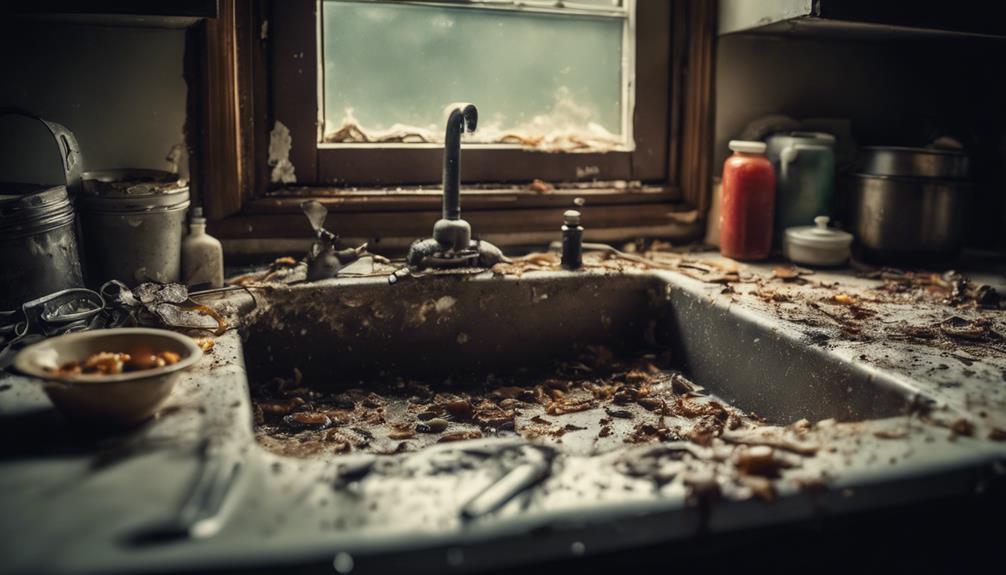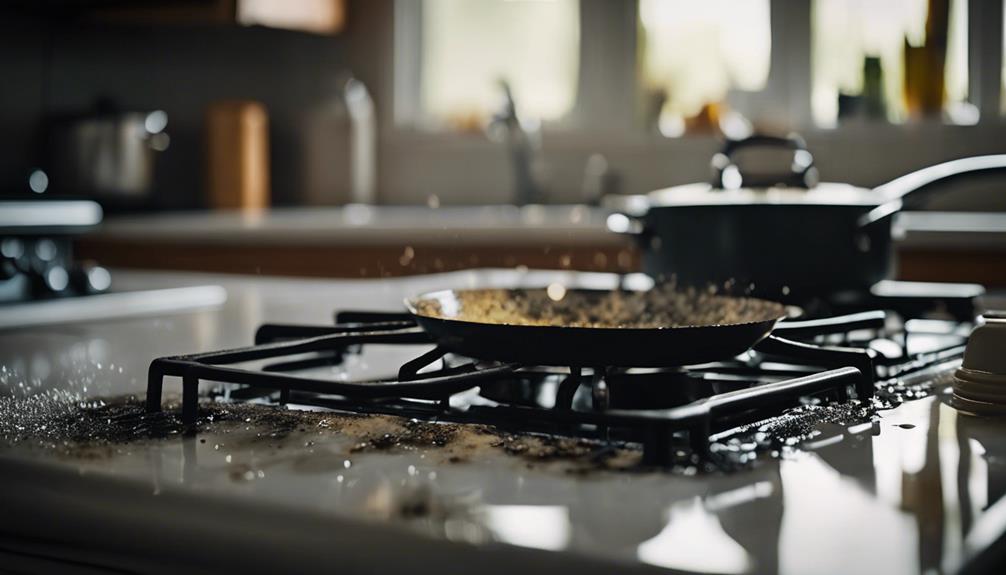Proper kitchen grease cleanup is essential for a safe cooking space. It helps prevent health risks from harmful bacteria and lowers fire hazards in kitchens. Cleaning grease regularly maintains cleanliness and prevents plumbing issues. Neglecting cleanup can lead to foul odors, clogs, and even violations. Ensuring proper grease disposal is paramount for water quality and avoiding costly repairs. A clean grease trap is indispensable for safety and efficiency. Managing grease effectively reduces the risk of equipment malfunction. Remember, maintaining a clean kitchen environment extends the lifespan of equipment and promotes a healthier space.
Key Takeaways
- Prevents health risks from harmful bacteria in grease buildup.
- Reduces fire hazards in commercial kitchens.
- Extends equipment lifespan with regular cleaning.
- Prevents plumbing issues and sewer backups.
- Maintains a clean, safe, and efficient kitchen environment.
Importance of Proper Grease Cleanup
Properly cleaning up grease in your kitchen is essential for maintaining a safe and healthy cooking environment. Grease, if not cleaned regularly, can accumulate in various kitchen surfaces and equipment, posing health risks due to the potential growth of harmful bacteria and microorganisms. It's vital to manage grease effectively to prevent the trap from becoming a breeding ground for pathogens that could lead to food poisoning.
In a commercial kitchen setting, where the volume of cooking is high, proper grease cleaning is even more important. The build-up of grease increases the risk of fire hazards due to its flammability. Regular cleaning not only guarantees a safe environment for kitchen staff and customers but also contributes to the longevity of kitchen equipment. By keeping grease cleaned and managed properly, you reduce the chances of needing frequent replacements and maintain a safer cooking space for everyone involved.
Benefits of Grease Removal
Removing grease regularly offers several benefits for maintaining a clean and safe kitchen environment. Proper grease cleanup is essential for the maintenance of grease traps in both residential and commercial kitchens. By ensuring the regular cleaning and maintenance of grease traps, you can prevent costly plumbing issues and sewer backups.
Additionally, clean grease traps reduce the risk of unpleasant odors and pest infestations, creating a more hygienic space for food preparation. Effective grease removal not only enhances the overall cleanliness of the kitchen but also extends the lifespan of valuable equipment and appliances.
Moreover, by managing grease traps properly, you can contribute to preventing environmental contamination and health hazards. Embracing safe and efficient grease trap cleaning practices is key to ensuring a healthy kitchen environment and avoiding potential risks associated with neglecting grease cleanup.
Risks of Neglecting Grease Cleanup

Neglecting grease cleanup in your kitchen can lead to a host of serious consequences that not only impact your kitchen's cleanliness but also pose risks to your finances and health. Failing to perform regular cleaning can result in grease build-up, causing slow drainage, clogs, and backups in your pipes. These blockages may require costly professional cleaning services to remove.
Additionally, the accumulation of grease in traps can lead to health hazards and foul odors due to decomposing fats. Neglected grease cleanup can also result in violations of local regulations, leading to fines and penalties for poor grease management. Failure to address grease trap maintenance can cause sulphuric acid damage, resulting in expensive repairs and maintenance.
It's crucial to stay proactive in grease cleanup to prevent these issues and maintain a safe, clean kitchen environment for you and your family.
Environmental Impact of Grease Disposal
Improperly disposing of grease can have significant environmental consequences, impacting local waterways and sewage treatment plants. When grease is improperly disposed of, it can lead to up to 17,000 pounds of grease entering sewage treatment plants annually from a single restaurant.
Neglected grease traps can cause foul odors from decomposing FOG, affecting the environment and local waterways. In addition, grease leaks from neglected traps can result in blockages in the drainage system, leading to costly repairs from sulphuric acid damage.
Failure to maintain grease traps can also result in fines and penalties for poor grease trap management, impacting the restaurant financially. Routine maintenance of grease traps is essential to keep commercial kitchens safe, efficient, and to preserve the quality of local water sources.
Ensuring Kitchen Safety Through Grease Management

Properly managing grease in your kitchen is vital for ensuring a safe and efficient environment for both staff and customers. A restaurant grease trap is a device designed to intercept greasy solids before they enter the drainage system.
To maintain a safe kitchen, clean grease traps are essential. Regular grease trap cleaning is necessary to keep the trap in good working order. When a grease trap isn't cleaned regularly, grease can leak and cause blockages in the system, leading to potential hazards like slippery floors and kitchen fires.
Efficient grease management not only prevents accidents but also reduces the risk of equipment malfunction. Additionally, proper grease cleanup minimizes health risks associated with grease particles in the air, ensuring a healthier working environment for your kitchen staff.
Conclusion
So, there you have it folks! Proper kitchen grease cleanup is absolutely essential for maintaining a safe and functional kitchen. Neglecting grease removal can lead to a slippery slope of risks and environmental hazards.
Remember, a clean kitchen is a happy kitchen – and a happy kitchen means happy chefs! So don't let grease get the best of you, keep that kitchen sparkling and grease-free!